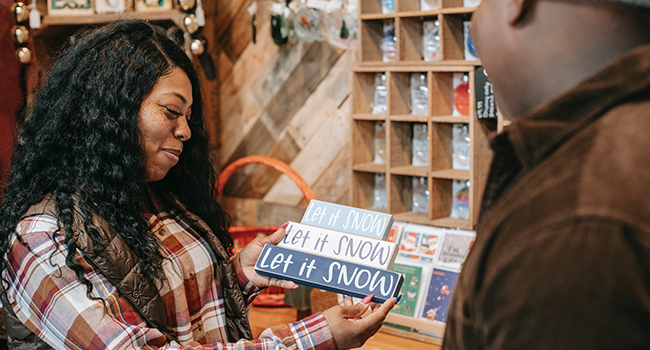 I’m one of the worst people you can have buying you gifts. I tend to be one of those guys who shop on Men’s Day at the mall, which is more generally referred to as Christmas Eve.
I’m one of the worst people you can have buying you gifts. I tend to be one of those guys who shop on Men’s Day at the mall, which is more generally referred to as Christmas Eve.
When I was in retail, I would be tired after weeks of selling others gifts and helping them prepare for a special Christmas. Shopping for gifts was often the last thing I wanted to do.
I would usually resort to purchasing the last thing Margaret mentioned that was an issue in the house. Range hoods, vacuum cleaners, silver garbage cans and even a toilet plunger are gifts I’ve managed to buy and slip under the tree for my adoring wife.
Thank God, our family tradition has more focus on a baby sleeping in a manger than gifts themselves or I would probably spend most Christmas nights sleeping in the barn myself!
Christmas for many small business owners in retail is when they have more sales than at any other time of the year. Seasonal businesses can be frustrating to manage. As an owner, you might focus on preparing for sales that can be derailed by weather, economy, technology, social changes or just down-right bad luck.
Imagine if all your income was based on how you preformed in just a few weeks of the year?
You might feel the stress that some owners of seasonal businesses feel. When everything goes just right, you get a bonus, but face an unforeseen a hiccup and you’re scratching to pay the bills for the year.
Unfortunately, if those owners don’t get the timing right, a few missteps can create a year of little or no profits. Christmas for those business owners can be bleary indeed.
Owning a business based on seasons can be challenging but by thinking outside the box, some people in business have developed a whole new industry. Here are some examples:
From snow to bikes and golf: Ski hills have changed their businesses by running their lifts in the summer as well. This industry has discovered that they don’t need to be idle when there’s no snow. Downhill mountain biking is the rage and by opening in the summer, and adding a golf course, ski hills around the world have created new sources of income that have allowed some to increase their revenue streams to offset years when the snow doesn’t show.
Landscape to snow and lights companies: Many landscape companies turn to snowscape when the white stuff falls. Snow removal employs much of the same equipment used in the summer, just in a different manner. Some landscape companies focus on erecting Christmas lights and Christmas décor. By using your investments differently in various seasons, expenses can become profits. Another option might be to add energy audits or renovation services to those clients with whom you have built up trusting relationships.
Restaurants to food trucks or training: The food business can be very seasonal. To offset this, restaurateurs need to be creative. To diversify their reliance on the seasonal business, some entrepreneurs – including some well-known ones – have expanded to food trucks to add revenue in the off-season. One of our clients is developing a plan to diversify from restaurant cooking to specialized cooking classes in the off-season.
Chocolate and flowers: Chocolate and flowers are big sellers three times a year: Valentine’s Day, Christmas and Mother’s Day are when the majority of these products are sold. Instead of waiting for these very seasonal business opportunities, some entrepreneurs are trying to figure out how to have a year-round business. Some flower providers service hotels, offices and people who want weekly or daily flower arrangements to impress their guests. Chocolate manufacturers look to customized designs for tourist locations to spike summer sales that are typically slower.
Heaters by winter, solar panels by summer: A U.K.-based company wasn’t satisfied just selling water heaters in the winter and being slow all summer. It diversified to selling solar panels in the summer and now has a booming year-round business.
There are plenty more examples of how you can diversify your business so you won’t be hamstrung by seasonality. The soup shop that sells ice-cream, the vacation company that does corporate retreats, bike shops that sell skates or skis, and the Tipsy Elves Christmas sweater company that now sells clothing to college students year-round are examples of ingenuity that saved businesses. The options are endless.
Thinking outside the box sometimes takes an outsider to inspire you to see your opportunities. Creating a business that’s busy year-round results in less cash flow challenges and less stress.
You might not decide to buy better gifts for Christmas but you will probably be in a better position to afford them.
Dave Fuller, MBA, is an award winning business coach and a partner in the firm Pivotleader Inc. His wife will be receiving a pressure cooker as a gift this year for Christmas and he will be sleeping in the doghouse, unless you send him a better gift idea. Dave can be reached at [email protected]
For interview requests, click here. You must be a Troy Media Marketplace media subscriber to access our Sourcebook.
The views, opinions and positions expressed by columnists and contributors are the author’s alone. They do not inherently or expressly reflect the views, opinions and/or positions of our publication.


